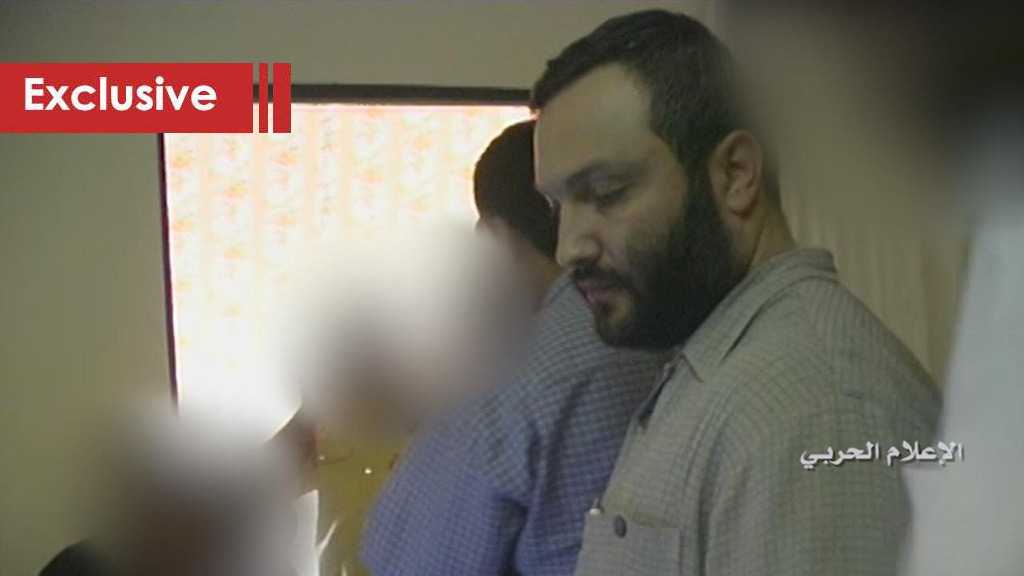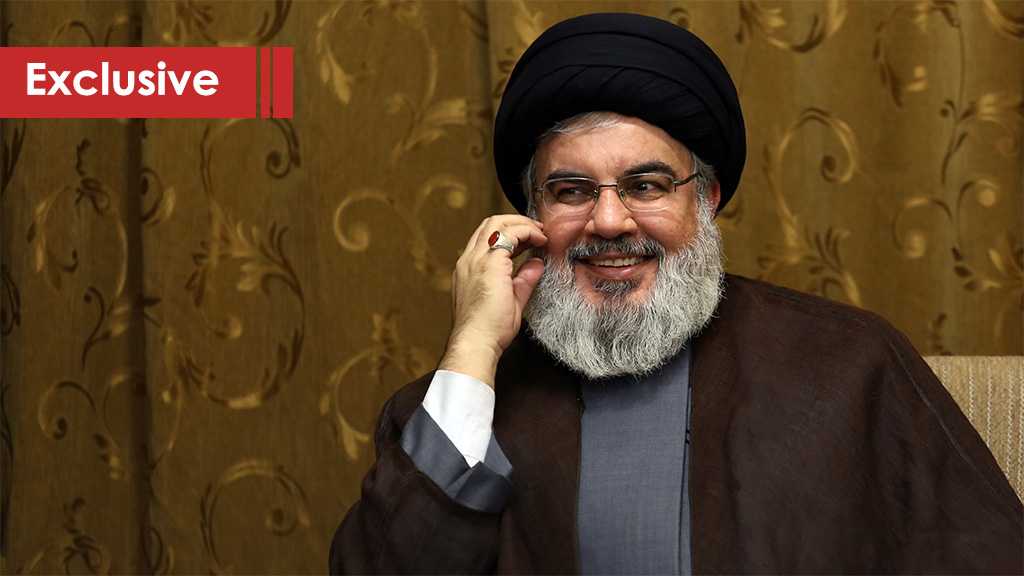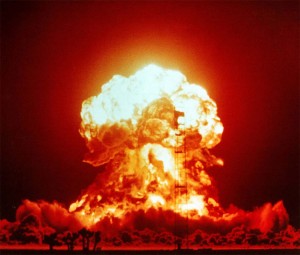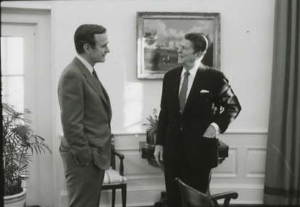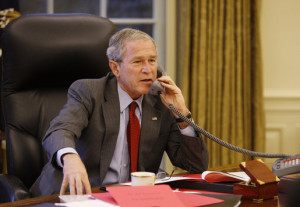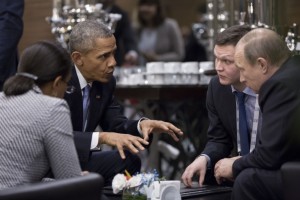 His bluster long ago wore thin. Iranian/Israeli/Middle East analyst Meir Javedanfar said he put himself up a tree and wants Obama to bring him down. “It’s come down to threats, threats, threats, but we are at a saturation point.”
His bluster long ago wore thin. Iranian/Israeli/Middle East analyst Meir Javedanfar said he put himself up a tree and wants Obama to bring him down. “It’s come down to threats, threats, threats, but we are at a saturation point.”
 Growing numbers of Israelis reject him for good reason. He menaces them like others. Attacking Iran assures retaliation most Israelis fear. It’ll mean widespread destruction, radiation contamination, and large numbers killed or injured.
Growing numbers of Israelis reject him for good reason. He menaces them like others. Attacking Iran assures retaliation most Israelis fear. It’ll mean widespread destruction, radiation contamination, and large numbers killed or injured.
Gush Shalom founder Uri Avnery asked if he and Barak are mad or crazy? Netanyahu “may be crazy, but he is not mad. (Barak) may be mad, but he is not crazy.”
They’re an incendiary duo, but won’t attack Iran. Avnery quoted the film line: “If you have to shoot, shoot. Don’t talk.” He calls Netanyahu/Barak “beyond rational thinking.”
Israeli political analyst Yossi Alpher called Netanyahu’s antics “overkill. The US establishment is fed up with him. The Israeli public is fed up with him.” He created a “public controversy” and doesn’t know how to get out of it.
His vow to go it alone is bluster, not bite. Instead of calming things down, inflammatory comments follow earlier ones. On August 2, the Jerusalem Post headlined “Winograd: Striking Iran may endanger Israel’s future,” saying:
Former Supreme Court Justice Eliyahu Winograd opposes attacking Iran for good reason. In 2006, he headed the Committee of Inquiry on why Israel’s Lebanon war failed. He said:
 “I am not convinced that the decision-makers will implement the findings of that report. If that is the case, we are all in big trouble.”
“I am not convinced that the decision-makers will implement the findings of that report. If that is the case, we are all in big trouble.”
He denounced Netanyahu/Barak hawkishness on Iran despite strong opposition by senior Israeli past and current officials.
“All the heads of the defense establishment, the Shin Bet, the Mossad, both former and current, and military intelligence, everyone is saying ‘Don’t attack!’ ”
“(O)nly Barak and Netanyahu have decided yes,” or have they? Bluster often hides intentions. Bullies usually back down when confronted.
Winograd’s committee called Israel’s Lebanon war a failure. Political leaders didn’t sufficiently consult with military officials before attacking. They left before they looked.
Home Front preparedness was also inadequate. Little attention was given then and again now. A “rain of missiles” may follow attacking Iran. Israel is woefully unprepared. How many Israelis will die for Netanyahu/Barak’s folly? Why should any when peace avoids bloodshed.
How much longer will they put up with their bluster? Winograd criticized Netanyahu for complaining about former officials expressing views publicly. He’s more vocal than anyone.
“You intend to act. Sit down and shut up. Decide secretly if you’re attacking, and if you decide to attack, attack. But what are you talking for? So that the Iranians will be even more prepared and ready their missiles to target us?”
“You are going to endanger our entire country, everything we have built. Both the country physically and the economy.”
 Opposition leader Shaul Mofaz echoed his comments, saying:
Opposition leader Shaul Mofaz echoed his comments, saying:
“Israel cannot act alone to prevent the Iranian nuclear program at this time. Such action might bring us into a very difficult war.”
Days earlier, Mofaz called Netanyahu “confused, stressed out and unfocused. (He) lost the trust of the security chiefs,” Obama and Shimon Peres. Former Mossad head Efraim Halevy fears a generation of war if Israel attacks Iran.
 “We have to take into account the possibility that if we attack Iran’s nuclear facilities, there will no longer be a political horizon in regard to Iran or sanctions against Iran.”
“We have to take into account the possibility that if we attack Iran’s nuclear facilities, there will no longer be a political horizon in regard to Iran or sanctions against Iran.”
“We have to deploy for the possibility that while the immediate result of the operation will be Israel’s glorification in the Sunni Arab world, the later result will be a sharp anti-Israeli public wave in the spirit of the Arab Spring.”
“We need to understand that after the attack, a deep Israeli complex will develop in Iran, one that crosses parties and opinions and communities, because we will become the symbol of those that humiliated Iran and prevented it from restoring its greatness.”
“We need to remember that we are very much dependent on the United States and not utter boastful slogans that we are sovereign and therefore will take our fate into our hands.”
 Weeks ago, former Mossad head Meir Dagan said Israel faces no existential threat. He criticized inflammatory warmongering and urged changing Israeli’s system.
Weeks ago, former Mossad head Meir Dagan said Israel faces no existential threat. He criticized inflammatory warmongering and urged changing Israeli’s system.
“(W)e need a prime minister,” he said,” who will not be subject to political pressures when deciding on such issues as an attack on Iran or a peace agreement.”
“The State of Israel is at a critical point in time of great challenges both foreign and domestic. Minority groups are controlling the state and the majority is not being heard.”
 Former Military Intelligence head Major General (ret.) Uri Saguy also believes Netanyahu/Barak are heading Israel over a cliff. He expressed outrage over their dangerous warmongering. He called it “orchestrated and purposely timed hysteria that puts the country into a state of anxiety, artificial or not.”
Former Military Intelligence head Major General (ret.) Uri Saguy also believes Netanyahu/Barak are heading Israel over a cliff. He expressed outrage over their dangerous warmongering. He called it “orchestrated and purposely timed hysteria that puts the country into a state of anxiety, artificial or not.”
His bottom line is that Netanyahu/Barak can’t be trusted. How can they be by putting Israelis and others in danger. IDF chief of staff Benny Gantz and Mossad head Tamir Pardo also oppose war.
So do Air Force head Amir Eshel, Military Intelligence chief Aviv Kochavi, Shin Bet director Yoram Cohen, and other top Israeli officials. Netanyahu/Barak are increasingly isolated.
On September 4, Haaretz headlined “In the Iranian poker game, Netanyahu and Barak have overplayed their hand,” saying:
The Israeli Hayom daily has close ties to Netanyahu. In recent weeks, it’s featured a barrage of worrying reports on Iran’s alleged nuclear progress and Washington’s failure to halt it.
In the last few days, something changed. On August 31, it highlighted Joint Chiefs Chairman General Martin Dempsey’s comments about America’s unwillingness to be complicit if Israel goes it alone.
The strategically timed IAEA report got second billing. On September 1, Iran got back page coverage. On September 3, it again made headlines, “but only in the form of Israel Defense Forces Chief of Staff Benny Gantz’s vague statement that the IDF can act ‘anywhere, anytime.’ ”
In other words, the daily out in front echoing inflammatory Netanyahu comments now backed off. “Does this indicate that (he’s) seeking a ladder to climb down from” his perch high up in a tree and very much out on a limb?
Perhaps he overplayed his hand. Crying wolf enough times begins falling on deaf ears. Growing Netanyahu/Barak public disapproval also matters. So does disagreement with Washington. It’s over timing, not policy.
Key is that Netanyahu/Barak talk is bluster. Without Washington’s support, attacking Iran won’t happen. Haaretz thinks inflammatory Israeli comments damaged US/Israeli relations. Perhaps eventually but not now.
Key is what major media reports don’t say. Their common theme is suppressing truth and full disclosure. On Iran, Haaretz is no different. The Islamic Republic poses no Israeli or regional threat. Its nuclear program is peaceful.
Top world leaders know it. Over 100 NAM countries support it. They oppose US/Israeli warmongering. Their agenda is peace, not conflict. They respect national sovereignty inviolability.
They know international law prohibits interfering in the internal affairs of other countries. It’s also unequivocal against attacking another one except in self-defense.
These issues are ignored in America’s media, what’s seen and read across Europe, and what Israeli broadcast and print media report. They’re key above all others. Failure to discuss them advances the ball for war.
Doing so is reckless, irresponsible, and complicit. It puts culpable journalists in the same category as propagandists. Blood will be on their hands if it’s shed.
Apologies won’t be forthcoming for being on the wrong side of rule of law principles, support for what should be condemned, and failure to do what good journalists should – their job.
A Final Comment
On September 4, Israeli intelligence officials briefed Netanyahu and security cabinet members. They do it annually or when special occasions arise.
They focused on Iran, Syria, Egypt, and US/Israeli relations. The meeting was closed. Ministerial aides and advisors weren’t invited. Military intelligence, Mossad and Shin Bet participated. So did Foreign Ministry representatives.
A follow-up meeting is likely. Hopefully opposition to inflammatory rhetoric was stressed. Honest talk about no existential threat needs highlighting and repetition. Truth needs to be separated from what’s not. Above all, avoiding potentially catastrophic war is vital.
French Foreign Minister Laurent Fabius is no peacenik. He’s hardline for direct Western intervention against Syria. His no-fly zone/safe haven advocacy means war if either or both are instituted.
At the same time, he warns about attacking Iran. “I think that if there were an Israeli attack, unfortunately it could come back to haunt Israel,” he said.
“I am absolutely opposed to the idea that Iran would gain nuclear weapons,” he said, “but I think if there was an Israeli attack,” Tehran will be victimized and gain legitimacy.
Britain’s defense establishment Royal United Services Institute director Michael Clarke says there’s “no basis in international law for preventative, rather than preemptive, war.”
There’s no basis for either except when clear evidence shows foreign forces mobilized for attack.
Israeli borders aren’t threatened. Iran supports peace, not war. Its nuclear program is legal and non-military. It fully complies with NPT provisions.
Those issues deserve daily headlines. Don’t expect warmongering media to feature them.
Stephen Lendman lives in Chicago and can be reached at lendmanstephen@sbcglobal.net.
His new book is titled “How Wall Street Fleeces America: Privatized Banking, Government Collusion and Class War”
http://www.claritypress.com/Lendman.html
Visit his blog site at sjlendman.blogspot.com and listen to cutting-edge discussions with distinguished guests on the Progressive Radio News Hour on the Progressive Radio Network Thursdays at 10AM US Central time and Saturdays and Sundays at noon. All programs are archived for easy listening.
http://www.progressiveradionetwork.com/the-progressive-news-hour
River to Sea Uprooted Palestinian
Uprooted Palestinian 
The views expressed in this article are the sole responsibility of the author and do not necessarily reflect those of this Blog!
Filed under: IAEA, War on Iran | Tagged: Barak, Benjamin Netanyahu, IAEA, Ibrahimi Mosque, Stephen Lendman, Zionist Shin Bet | 2 Comments »





